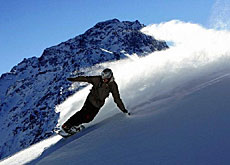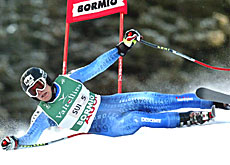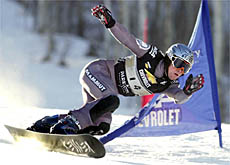Alpine skiers are no longer kings of the hill

For the first time since 1966, Switzerland’s alpine skiers have failed to win a single medal at the world championships.
Their poor performance has been further highlighted by the string of successes recorded by the country’s snowboarders on the World Cup circuit.
None of Switzerland’s top skiers was able to keep up with the competition in Bormio, scene of the Alpine World Ski Championships.
Eight top-ten finishes was the sum of the men’s team’s achievements over the past two weeks.
The women’s team fared even worse, with Nadia Styger’s eighth place in the super-G the pick of the bunch.
The Bormio disaster has led to a media frenzy in Switzerland. Newspapers such as the mass-market Blick have been lamenting the skiers’ lack of success and demanding that heads roll.
Gian Gilli, head of competition at the Swiss Ski Federation, admits the team’s form is worrying just one year before the Winter Olympics in Turin.
“We came to Bormio with three aims,” he told swissinfo. “We wanted to test our organisational capacity, project a positive image of Swiss skiing, and get some results.”
With the federation under fire, the team’s reputation in tatters, and no medals to show for their efforts, the Swiss appear to have failed on all counts.
Resignations
Gilli insists he has no plans to fiddle with the men’s team, which has managed to scrape together a few podium finishes this season.
But he is about to ring the changes in the women’s team, which has been coached this season by Marie-Theres Nadig, who won two gold medals at the Sapporo Olympics in 1972.
Three other members of the women’s coaching staff, Franz Kohlhuber, Hans Flatscher and Sepp Brunner are also likely to come under tough scrutiny.
Gilli revealed that some coaches had already offered to resign, although he refused to say how many or give any names.
“Something is not working and I am ready to review my own position,” he said.
Generation switch
The skiers’ repeated failures have been further exposed by the excellent results recorded by Switzerland’s snowboarders. Last week the country’s men and women dominated alpine events in Italy.
According to Bertrand Denervaud, a former world champion and president of the now-defunct International Snowboarding Federation, Swiss success owes much to the nature of the sport.
“The Swiss like to try something new and there was a whole generation that started snowboarding,” he said.
“There were probably a few of those young people who, if they had stuck with skiing, would have become very good competitors.”
The lack of a strong stable of up-and-coming skiers has been pinpointed as one of the reasons the Swiss skiing team have underperformed over the past few years.
Gilli believes the financial burden of getting to the top is turning many youngsters away from the sport.
The price of a year at Engelberg’s ski academy, the only school in Switzerland where young people can train and pursue their education at the same time, can cost anything up to SFr25,000 ($21,000) a year, not including equipment or clothing.
Money threat
But others say that Switzerland’s skiing officials should take a closer look at how they groom successors to the great champions of the past, such as Pirmin Zurbriggen, Bernhard Russi, Vreni Schneider and Erika Hess.
“In sports where there is an official structure to help youngsters, Switzerland is always behind other nations,” said Denervaud. “That’s why we can’t keep up with the competition.”
Even the country’s all-conquering snowboarders claim they are being short-changed by those running the sport.
Last year some of them – including Olympic champion Philipp Schoch – threatened to compete for other nations if more financial support from the federation was not forthcoming.
Denervaud agrees, saying the federation needs to act fast to cement Switzerland’s status as one of snowboarding’s leading nations.
“[Other] countries will start investing in teams that can win medals at the Olympics,” he said. “Due to snowboarding’s heightened media presence at the Games, more money will start to flow, and that’s when I fear Switzerland will start losing ground.”
swissinfo, Scott Capper
The last time the Swiss failed to win a medal at the world championships was in 1966 in Portillo, Chile.
This year, the men managed eight top-ten finishes, the best results a fifth in the downhill and the combined event.
Nadia Styger earned two top-ten finishes for the women, with an eighth place in the super-G and a ninth in the downhill.
The first known snowboard was a Snurfer, built in 1966.
Snowboarding took hold in the early 1980s, and the first unofficial world championships were held in California in 1983.
In 1987, a World Cup tour was established, with two stops in the United States and two in Europe.
The International Ski Federation recognised the sport in 1994, and it made its first appearance at the Olympics in 1998.

In compliance with the JTI standards
More: SWI swissinfo.ch certified by the Journalism Trust Initiative



You can find an overview of ongoing debates with our journalists here. Please join us!
If you want to start a conversation about a topic raised in this article or want to report factual errors, email us at english@swissinfo.ch.